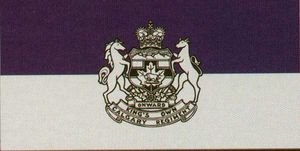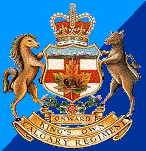King's Own Calgary Regiment: Difference between revisions
No edit summary |
Melissaeng (talk | contribs) (→Victoria Cross: +) |
||
| (5 intermediate revisions by 2 users not shown) | |||
| Line 54: | Line 54: | ||
==Interesting Facts== | ==Interesting Facts== | ||
The Regimental March of the King's Own Calgary Regiment is "Colonel Bogey", the same tune that gained popularity in the motion picture The Bridge On The River Kwai. | [[image:Camp Flag KOCR Low Res.jpg|right|300px|thumb|The KOCR Camp Flag.]] | ||
The Regimental March of the King's Own Calgary Regiment is "Colonel Bogey", the same tune that gained popularity in the motion picture The Bridge On The River Kwai. | |||
The motto of the KOCR | The motto of the KOCR is ONWARD, also the motto of the City of Calgary. | ||
The first cap badge of the Calgary Regiment | The first cap badge of the Calgary Regiment was inspired by the Coat of Arms of the City of Calgary. The sunburst violated custom, however, in that the sunburst was above the Crown. When the Regiment was redesignated as King's Own after the Second World War, the offending sunburst was removed. The current badge is still very heavily influenced by the City's coat of arms. | ||
The Regiment has an alliance with the King's Own Royal Border Regiment of the British Army. | The Regiment has an alliance with the King's Own Royal Border Regiment of the British Army. | ||
The Regimental Monument consists of a Sherman HVSS, mounted on a Bailey Bridge commemorating the 33rd Field Engineer Squadron, installed on the southeast lawn of Mewata Armoury. | |||
==Victoria Cross== | |||
John George Pattison of the 50th Battalion, CEF, was awarded the VC for his actions at Vimy Ridge in April 1917. He was killed a few weeks after his VC action. A bridge over the Elbow River is named for him. | |||
[[Category: Armoured Regiments]] | [[Category: Armoured Regiments]] | ||
Latest revision as of 23:54, 8 June 2006
|
The King's Own Calgary Regiment (RCAC) is a Land Force Reserve armoured regiment. The regiment parades regularly at Mewata Armouries (where their headquarters are located) as well as training at the Area Support Centre in Calgary as well as at Canadian Forces Base Wainwright. The Regiment has contributed many men to overseas Peacekeeping missions in recent years, as well as providing instructors and resources for training courses for units throughout the Calgary Garrison and 41 Canadian Brigade Group.
History
On 15 May 1924, when the First Battalion of the Calgary Regiment was redesignated simply "Calgary Highlanders" and formed into its own regiment, the Second Battalion of The Calgary Regiment was likewise redesignated to become simply The Calgary Regiment. Thus were born two equally proud units, both direct descendants of the 103rd Regiment (Calgary Rifles) that had been created on 1 April 1910.
The new Calgary Regiment inherited the history of several CEF battalions that had fought in the Great War, including the Battle Honours of the 50th (Calgary) Battalion, and now proudly lay claim also to the memory of John George Pattison (shown at right) who was awarded the Victoria Cross for actions on 10 April 1917 at Vimy Ridge. He was killed in action less than two months later. Seventeen hard earned Battle Honours were granted the 50th for service with the 4th Canadian Division in France and Flanders.
In 1936, after extensive reorganization of the Militia, the Regiment was briefly retitled as a Machine Gun Regiment, and then later in the year redesignated Calgary Regiment (Tank) becoming one of just six Infantry regiments in Canada so designated. In 1939, the unit was not mobilized, and some officers and men enlisted in other units mobilizing for war, including the Calgary Highlanders. Mobilization came in February 1941, as 14th Army Tank Battalion (The Calgary Regiment (Tank))
The home service component of the Calgary Regiment (Tank) was redesignated in April 1941 as the 14th (Reserve) Army Tank Battalion (The Calgary Regiment(Tank)), and in 1942 the designation "Regiment" was subsituted for "Battalion." The former infantry (Tank) regiments, along with the former horse cavalry units, were mechanized and formed the new Canadian Armoured Corps (which would be granted the Royal prefix in 1945).
While this unit trained in Canada as part of the reserve army the overseas battalion trained on a variety of equipment in England, and on 19 August 1942 provided the armour support component of the Dieppe Raid. The history of the Raid is well known. The tanks of the Calgary Regiment were for the most part unable to get off the landing beaches. However, the tank crews resolutely stayed at their posts, finding the armour of their Churchill tanks impervious to the German anti-tank weaponry found defending the beach. Many crews stayed in their tanks until every round of ammunition was expended, covering the landing and eventual withdrawal of the infantry and foot-borne soldiers. Many tank crews thus went into captivity having sacrificed their freedom for the lives of the withdrawing soldiers.
The Regiment was rebuilt in England, becoming the 14th Canadian Armoured Regiment and re-equipping with Sherman tanks. As part of the 1st Canadian Armoured Brigade, the unit landed in Sicily in July 1943 and onto the mainland of Italy in September. The brigade fought independently and in support of many different formations during the long campaign in Italy. With the rest of the Canadians in that theatre, they repatriated to First Canadian Army in Holland in the spring of 1945, where they ended the war. Eventually, sixteen more Battle Honours were granted, to join those of the 50th Battalion CEF on the Regimental Guidon.
Several changes in designation occurred postwar.
- 22 July 1946: 14th Armoured Regiment (King's Own Calgary Regiment)
- 4 Feb 1949: The King's Own Calgary Regiment (14th Armoured Regiment)
- 19 May 1958: The King's Own Calgary Regiment (RCAC)
When the Highlanders were presented a new Queen's Colour by Her Majesty Queen Elizabeth II in June 1990, the KOCR were also full participants on parade, being inspected by Her Majesty as well as performing a very impressive roll past with their Cougars and Iltis vehicles.
The Regiment is always actively recruiting prospective soldiers interested in the challenges and experiences they will find in a Reserve Armoured Regiment.
Interesting Facts

The Regimental March of the King's Own Calgary Regiment is "Colonel Bogey", the same tune that gained popularity in the motion picture The Bridge On The River Kwai.
The motto of the KOCR is ONWARD, also the motto of the City of Calgary.
The first cap badge of the Calgary Regiment was inspired by the Coat of Arms of the City of Calgary. The sunburst violated custom, however, in that the sunburst was above the Crown. When the Regiment was redesignated as King's Own after the Second World War, the offending sunburst was removed. The current badge is still very heavily influenced by the City's coat of arms.
The Regiment has an alliance with the King's Own Royal Border Regiment of the British Army.
The Regimental Monument consists of a Sherman HVSS, mounted on a Bailey Bridge commemorating the 33rd Field Engineer Squadron, installed on the southeast lawn of Mewata Armoury.
Victoria Cross
John George Pattison of the 50th Battalion, CEF, was awarded the VC for his actions at Vimy Ridge in April 1917. He was killed a few weeks after his VC action. A bridge over the Elbow River is named for him.
